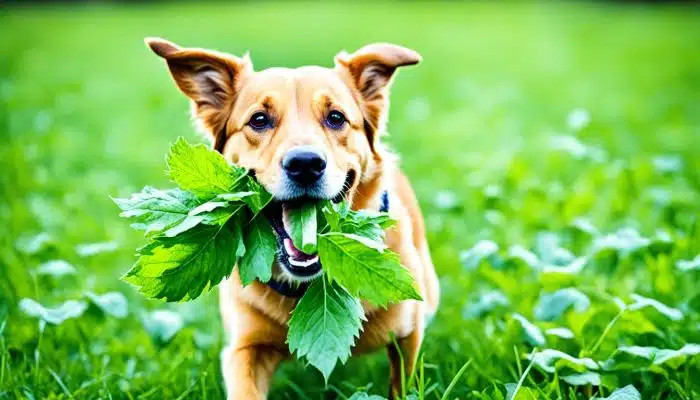As a pet owner, it’s essential to ensure that your golden retriever is getting the right amount of food to maintain a healthy weight. Understanding your dog’s dietary needs can help you identify signs of overeating and prevent health problems related to excessive weight gain.
Overeating in dogs can lead to obesity, which can put them at risk for various health issues, including joint problems, heart disease, and even cancer. Therefore, it’s crucial to monitor your dog’s food intake and ensure they are getting a balanced diet.
Key Takeaways
- Understanding your golden retriever’s dietary needs is essential to maintain a healthy weight.
- Overeating in dogs can lead to health problems like obesity and increase the risk of developing various diseases.
- It’s crucial to identify signs of overeating and take necessary steps to establish healthy feeding habits for your dog.
Assessing Your Golden Retriever’s Food Intake
One of the most critical aspects of managing your golden retriever’s diet is assessing their food intake. Golden retrievers are known to enjoy their food, and it can be easy for them to overeat. As a responsible pet owner, it’s essential to monitor your dog’s eating habits and ensure they are getting the right amount of food.
How much should a golden retriever eat?
The amount of food your golden retriever should eat depends on their age, weight, activity level, and overall health. As a general rule of thumb, a healthy adult golden retriever weighing around 60 pounds should consume between 2 and 3 cups of food per day. However, it’s vital to remember that every dog is unique, and their dietary needs may vary.
Controlling your dog’s food intake
Controlling your golden retriever’s food intake is crucial to ensure they are eating the right amount. One way to do this is by measuring their food using a measuring cup or a kitchen scale. It’s also a good idea to divide their daily food intake into two or three smaller meals throughout the day. This approach can help prevent overeating and promote better digestion.
Monitoring your dog’s eating habits
Monitoring your golden retriever’s eating habits can help you identify any potential issues early on. Keep an eye on their appetite, weight, and any signs of overeating, such as vomiting, diarrhea, or lethargy. If you notice any sudden changes in their eating habits, it’s best to consult with your veterinarian to rule out any underlying health issues.
Identifying Signs of Overeating in Golden Retrievers
As a golden retriever owner, it’s important to be aware of the signs that your dog may be overeating. Overeating can lead to weight gain, which can increase the risk of health problems such as joint issues, heart disease, and diabetes. Understanding your dog’s dietary needs is essential for maintaining a healthy weight and promoting their overall wellbeing.
One sign that your golden retriever may be overeating is if they are consistently begging for food or seem insatiable. If they’re always looking for snacks or trying to eat your food, it may be a sign that they’re not getting enough nutrients from their own meals or that they’ve developed bad habits.
Another sign is if your dog is rapidly gaining weight. While it’s perfectly normal for young golden retrievers to gain weight quickly, if your adult dog is gaining weight at a rapid rate, it may be a sign that they’re consuming more calories than they’re burning. This can lead to obesity and other health issues down the line.
It’s important to establish a regular feeding routine and monitor your dog’s weight to ensure that they’re not overeating. If you’re unsure about how much your golden retriever should be eating, consult with your veterinarian. They can recommend a balanced diet and help you develop a weight management plan that works for your dog’s specific needs.
In addition to monitoring your dog’s food intake, it’s important to provide them with regular exercise to burn off excess calories. Taking daily walks and playing with your golden retriever can help them maintain a healthy weight and prevent overeating.
Overall, identifying signs of overeating in golden retrievers is essential for promoting a healthy weight and preventing health issues. By maintaining a balanced diet, monitoring their food intake and weight, and providing regular exercise, you can help ensure that your dog is happy and healthy for years to come.
Establishing Healthy Feeding Habits for Your Golden Retriever
As a dog parent, it’s essential to establish healthy feeding habits for your golden retriever to maintain their weight and overall health. Here are some practical tips to help you get started:
Create a Feeding Schedule
Establish a consistent feeding routine with specific times and portions. This will help you control your dog’s food intake and prevent overeating. Consult with your veterinarian to determine the appropriate amount of food for your golden retriever’s age, weight, and activity level.
Choose the Right Dog Food
Select high-quality dog food that meets your golden retriever’s nutritional needs. Look for brands that use real meat as the primary ingredient and avoid those with fillers or artificial preservatives. You can also consult with your veterinarian for recommendations on the best dog food for your golden retriever.
Implement Portion Control
Use measuring cups or a digital scale to measure your dog’s food accurately. Avoid free-feeding, which can lead to overeating and weight gain. Instead, divide your dog’s food into two or three meals per day to help control their food intake.
Monitor Your Dog’s Eating Habits
Keep track of your golden retriever’s eating habits, including how much they eat and how long it takes them to finish their meal. If your dog eats too fast, try using a slow feeder bowl to reduce the risk of overeating or gastrointestinal problems. Additionally, ensure that your dog has access to clean water at all times and avoid giving them table scraps or human food, which can lead to obesity and other health issues.
Maintain a Consistent Routine
Stick to your dog’s feeding schedule and avoid feeding them treats or snacks outside of their regular meal times. This will help maintain a healthy weight and promote optimal health for your golden retriever.
By implementing these healthy feeding habits, you can ensure that your golden retriever receives a balanced diet, which is essential for weight management and overall wellness. Remember to consult with your veterinarian for personalized advice on your dog’s specific nutritional needs.
Conclusion
As a responsible pet owner, understanding your golden retriever’s dietary needs is crucial in maintaining their health. By assessing their food intake, identifying signs of overeating, and establishing healthy feeding habits, you can ensure that your dog maintains a healthy weight and optimal nutrition. Remember, controlling your dog’s food intake and monitoring their eating habits are key to avoiding obesity and other weight-related health issues.
To determine how much should a golden retriever eat, consider their age, weight, activity level, and breed-specific needs. A balanced diet for golden retrievers should include high-quality protein, healthy fats, and essential vitamins and minerals. Don’t hesitate to consult with your veterinarian for personalized advice on choosing the right dog food and creating a feeding schedule that works for you and your pet.
Establishing healthy feeding habits involves implementing portion control, avoiding table scraps, and maintaining a consistent routine. By controlling your dog’s food intake, you can help them avoid overeating and maintain a healthy weight. Remember to monitor your dog’s eating habits and seek veterinary advice if you suspect they may be overeating or have weight-related health issues.
The key to ensuring your golden retriever’s health and well-being is to remain vigilant, informed, and proactive about their dietary needs. By following these guidelines and implementing healthy feeding habits, you can support your dog’s growth and development and enjoy a long and happy life with your furry companion.
FAQ
Is my golden retriever eating too much?
Understanding your dog’s dietary needs is crucial in determining if your golden retriever is eating too much. Additionally, monitoring their weight, activity level, and overall health can help you assess their food intake.
How much should a golden retriever eat?
The amount of food a golden retriever should eat depends on factors such as their age, weight, and activity level. It is recommended to consult with your veterinarian to determine the appropriate portion size for your dog.
What are the signs of overeating in dogs?
Signs of overeating in golden retrievers can include weight gain, excessive begging for food, and decreased activity levels. It’s important to be aware of these signs and adjust their diet accordingly.
How can I control my dog’s food intake?
You can control your dog’s food intake by measuring their portions, avoiding free-feeding, and establishing a feeding schedule. Additionally, providing them with appropriate treats and avoiding table scraps can help manage their food intake.
What should I do if my golden retriever is overeating?
If you believe your golden retriever is overeating, it’s important to consult with your veterinarian. They can provide guidance on adjusting their diet, increasing exercise, and ensuring they have a balanced and healthy menu.
How can I establish healthy feeding habits for my golden retriever?
Establishing healthy feeding habits involves creating a consistent feeding schedule, choosing high-quality dog food, and monitoring portion sizes. It is also important to avoid feeding your dog from the table and provide them with regular exercise.





